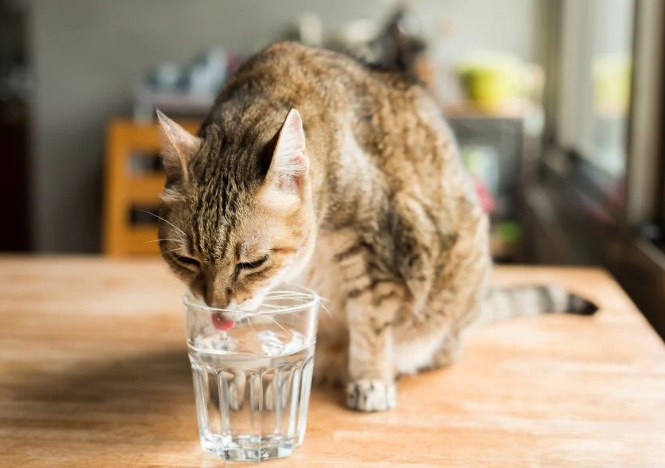Is Alkaline Water Good for Cats?
As pet owners, ensuring our feline friends have the best care is a top priority, and their hydration is no exception. With the rise in popularity of alkaline water for human consumption, some cat owners may wonder: is alkaline water good for cats? This article explores the benefits and potential risks of giving alkaline water to cats, explains why choosing the right type of water is critical for their health, and provides best practices for keeping your cat properly hydrated.

Understanding Alkaline Water
Alkaline water has a pH level higher than 7.0, typically between 8.0 and 9.0, due to added minerals like calcium, magnesium, and bicarbonate. Advocates claim that it can neutralize acidity in the body and provide various health benefits for humans. However, cats have unique physiology and dietary needs that differ significantly from humans, making it important to assess alkaline water’s effects on their health.
Is Alkaline Water Good for Cats?
The Short Answer
Alkaline water is not inherently harmful to cats, but it may not offer significant health benefits either. For most cats, plain, clean water with a neutral pH (around 7.0) is ideal.
The Scientific Perspective
Cats have a naturally acidic urinary system, which helps prevent urinary tract infections (UTIs) and the formation of struvite crystals. Altering the pH of their urine by consistently providing alkaline water could potentially disrupt this balance and increase the risk of urinary health issues, especially in cats prone to UTIs or bladder stones.
When Alkaline Water Might Be Acceptable
In certain situations, alkaline water could be beneficial for cats with specific health conditions, such as chronic kidney disease (CKD), where acidity in the body becomes problematic. However, this should only be considered under veterinary guidance, as improper use of alkaline water might worsen other conditions.
Why Choosing the Right Water Matters
Hydration and Overall Health
Proper hydration is essential for cats to maintain healthy kidney function, regulate body temperature, and support digestion. Dehydration can lead to severe health problems, including kidney disease and urinary issues.
Taste and Preference
Cats are notoriously picky drinkers. The taste and smell of water can significantly influence their willingness to drink. Some cats might prefer filtered or spring water over tap or distilled water.
Safety Considerations
Tap water in many areas may contain chlorine, heavy metals, or other contaminants that could harm your cat’s health over time. Filtering tap water can help reduce these risks.
Best Practices for Giving Water to Your Cat
1. Water Quality
- Filtered Water: This is often the best choice for cats. It removes harmful impurities while retaining beneficial minerals.
- Bottled Spring Water: A good alternative to filtered water, as it’s typically free of harmful additives.
- Avoid Distilled Water: Distilled water lacks essential minerals and may disrupt your cat’s electrolyte balance over time.
2. Water Temperature
Cats tend to prefer room-temperature water. Avoid giving them water that is too cold, as it might discourage drinking, or too warm, which could be unappealing.
3. Encouraging Hydration
- Multiple Water Sources: Place several water bowls around your home to make it convenient for your cat to drink.
- Fountain Bowls: Many cats enjoy drinking from running water, so investing in a cat water fountain can encourage hydration.
- Wet Food: Incorporating wet food into your cat’s diet can increase their water intake, as it contains about 70-80% moisture.
4. Daily Water Intake
On average, cats need about 3.5 to 4.5 ounces of water per 5 pounds of body weight daily. This includes water consumed through drinking and food. Monitor your cat’s intake to ensure they’re adequately hydrated.
5. Cleanliness
- Change your cat’s water daily to keep it fresh.
- Clean water bowls regularly to prevent bacterial growth.
Important Notes and Warnings
- Consult a Veterinarian: Before introducing alkaline water or any dietary changes, consult your veterinarian, especially if your cat has existing health conditions.
- Monitor for Changes: Observe your cat for signs of dehydration or urinary issues, such as frequent urination, straining, or changes in drinking habits.
- Avoid Flavored or Enhanced Waters: Stick to plain water without added flavors, sugars, or chemicals.
Conclusion
While alkaline water is not harmful in moderation, it is generally unnecessary for healthy cats. Clean, neutral pH water is the best choice to maintain your cat’s hydration and health. Ensuring your cat has access to fresh water, monitoring their intake, and choosing high-quality water sources are the keys to a happy and healthy feline companion. Always consult your veterinarian for personalized advice regarding your cat’s hydration and dietary needs.
